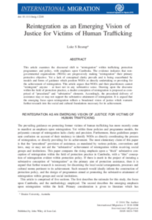ABSTRACT
This article examines the discoursal shift to “reintegration” within trafficking protection programmes and policy, with emphasis upon Cambodia. The evidence indicates that nongovernmental organizations (NGOs) are progressively making “reintegration” their primary protective objective. Yet a lack of conceptual clarity prevails and is being exacerbated by models and forms of guidance which position NGOs as directly undertaking or providing for the achievement of reintegration. This article argues that NGOs and their practitioners cannot “reintegrate” anyone – at least not in any substantive sense. Drawing upon the discourse within the field of protection practice, a dualist conception of reintegration is proposed as comprised of “procedural” and “substantive” elements. Accordingly, the procedural delivery of assistance may or may not support the substantive attainment of reintegration. It is argued that the emerging focus upon reintegration reflects a broadened vision of justice which warrants further research into the social and cultural foundations necessary for its achievement.

